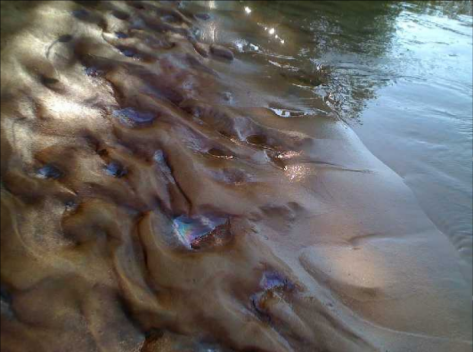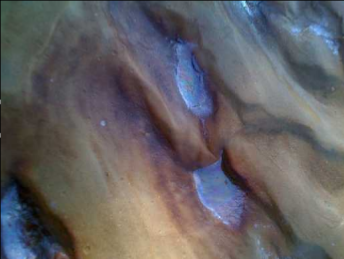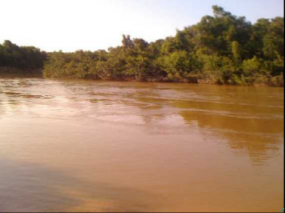In July 2013, a Canadian delegation participated in a public hearing at the Popular Tribunal on Extractive Industry Practices in Puerto Gaitain, Colombia. The purpose of the trip was to listen an array of witnesses, hear evidence and then evaluate the behaviour of Canadian oil company Pacific Rubiales Energy (PRE) in Puerto Gaitan. During the hearing, communities and social organizations demonstrated the negative social, cultural and environmental impacts of oil drilling in the region. One of the principal complaints was that PRE had contaminated water used for consumption and subsistence farming.
Proving water contamination is complex. While communities in the area have collected numerous testimonies about the changing quality of the water, technical evidence of contamination is difficult to obtain. Tests are costly and, in this case, they must be carried out in areas that are not easily accessible. Moreover, data is rarely available when it comes to water quality before oil drilling takes place, making time-based comparisons difficult.
Following the delegation, Projet Accompagnement Solidarité Colombie (PASC) coordinated an effort to collect and test water samples from Puerto Gaitán. The project, which took place in the fall of 2013, was carried out at the request of social organizations, like the Colombian oil workers’ union Unión Syndical Obrero (USO), which hope to eventually bring evidence of water contamination before national and international courts.
The project was made possible by support from the Centre de recherche interinstitutionnel en toxicologie de l’environnement at l’Université du Québec à Montréal (UQÀM), and financial assistance from the CSN and UNIFOR. The technical analysis was done by AGAT Laboratories in Montreal. The results demonstrate that five out of the twenty water samples collected contained an alarmingly high presence of hydrocarbons. Here are a few examples.
PRE transports oil via tanker trucks on a clay road, which results in a permanent cloud of dust. To solve this problem, the company applies water to the road daily. Local inhabitants have expressed concern that this water is actually waste water from oil production. Thus, upon evaporation, it leaves behind hydrocarbon particles, which mix with the surrounding dust, causing air contamination and posing a danger lung health. An inhabitant of the region has also complained that the runoff has contaminated her well water.
PASC’s field team was able to take a water sample directly from the pipe of a water application tanker. The results show a hydrocarbon concentration of 1040 μg/L. A sample from the surface of the above-mentioned well showed a rate of 1600 μg/L. In Quebec, the standard for potable surface water set by the Sustainable Development, Environment and Climate Change Ministry (MDDELCC) is 10 µg/L1 -- 100 times lower than concentrations in the samples taken by PASC’s team in Colombia.
The inhabitants of the Puerto Gaitan region have also complained that the methods that PRE uses to treat water are not sufficient. Indeed, the residual water from the rinsing station for the tankers simply passes through a waste water filter. Before treatment, the water contains a hydrocarbon concentration of 3190 μg/L, which drops to 2190 μg/L after the filter treatment. This ‘’filtered’’ water is then thrown directly into the Tilaba River. At the dumping point, the concentration is 570 μg/L, which is still higher than the MDDELCC standard of 130 μg/L (standard for acute risk situation, such as spilling) or even the second rate of 63 μg/L (standard that marks the prevention of chronic effects on the environment).
Along the Tilaba River, it is possible to observe the presence of hydrocarbons on its shores, as we can see in the image below.  According to criteria set by the MDDELCC, oil and petrochemical products should not be present at a concentration that can be detected by a visible film on the surface of the water.
According to criteria set by the MDDELCC, oil and petrochemical products should not be present at a concentration that can be detected by a visible film on the surface of the water.
It is difficult to prove that a company is responsible for water contamination, especially given that the national environmental authority gives the oil industry every right to pollute. However, it is possible, under certain circumstances, to prosecute before Canadian courts companies responsible environmental crimes committed outside of Canada (Manirabona 2011)2. Access to water is a fundamental right and every breach of this right should be denounced. Colombia and Canada have both ratified various international legal instruments which oblige these countries to ensure the full exercise of the right to water.
First, both Canada and Colombia ratified the International Covenant on Economic, Social and Cultural Rights on October 29th 1969 and May 19th 1976, respectively. Article 1 of the Covenant anticipates that in no circumstances “may a people be deprived of its own means of subsistence¨. Water contamination in the region of Puerto Gaitán represents a danger to public health, and to accessibility to adequate water supplies for subsistence farming3.
Article 12 of the Covenant stipulates that every person has the right « to the enjoyment of the highest attainable standard of physical and mental health »4. Moreover, Article 11 guarantees the right to a sufficient standard of living including the right to «adequate food, clothing and housing, and to the continuous improvement of living conditions»5. The term “’including’’ indicates that the list is not exhaustive, and that the right to access water is a necessary condition for a sufficient standard of living. Under these articles, a state commits a violation, through an act or omission, when it deliberately neglects its obligations to ensure the full enjoyment of the rights provided in the Covenant. It is thus clear that Canada and Colombia’s decision to ignore the contamination of drinking water by a Canadian company in Colombia is a violation of articles 11 and 12 of the ICESCR.
 Acknowledging the importance of this debate, in 2002 the ICESCR Committee adopted General Observation n° 15, in which it stated that access to water prevails over compliance with other human rights. It added that adequate access should be measured in availability, quality and accessibility. The committee stated that water quality is central to this analysis6.
Acknowledging the importance of this debate, in 2002 the ICESCR Committee adopted General Observation n° 15, in which it stated that access to water prevails over compliance with other human rights. It added that adequate access should be measured in availability, quality and accessibility. The committee stated that water quality is central to this analysis6.
In sum, Canada and Colombia have failed to adequately address water contamination by oil companies like Pacific Rubiales Energy in Colombian. As such, they have failed to ensure the right to access water, an obligation that they are obliged to respect under their international commitments.
Notes:
* See Canadian campaign : Open for justice.
1. Critères de qualité de l'eau de surface du gouvernement du Québec
2. MANIRABONA, Amissi, 2011. Entreprises multinationales et criminalité environnementale transfrontalière: applicabilité du droit pénal canadien. Cowansville, Québec : Éditions Y. Blais. ISBN 9782896356409 2896356401.
3. Doc off CES NU, 2002, DOC NU E/C.12/2002/11. À la p.4
4. Pacte international relatif aux droits économiques, sociaux et culturels (PIDESC), 16 décembre 1966, (entré en vigueur le : 3 janvier 1976, accession du Canada le 19 mai 1976 et de la Colombie le 29 octobre 1969)
5. Ibid. Art 11
6. Doc off CES NU supra note 1 à la p.6
